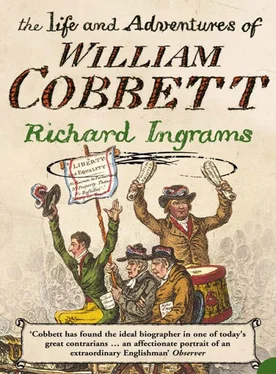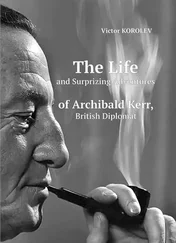1 ...8 9 10 12 13 14 ...20 It was a shattering blow for Cobbett, who claimed that the damages amounted to more than the total of all those ever awarded by the Philadelphia court in libel actions. One of his lawyers, Edward Tilghman, advised him to flee the country immediately, but, very typically, Cobbett was determined to stand his ground. He wrote to Edward Thornton (25 December 1799):
‘No,’ said I to Tilghman, in answer to his advice for immediate flight. ‘No, Sir, the miscreants may, probably, rob me of all but my honour, but that, in these degenerate times, I cannot spare. To flee from a writ (however falsely and illegally obtained) is what I will never do; for though, generally speaking, to leave the United States at this time, would be little more disgraceful than it was for Lot to run from Sodom under a shower of fire and brimstone; yet with a writ at my heels, I will never go.’
Nancy Cobbett was in full agreement:
Though she feels as much as myself on these occasions, nothing humbles her; nothing sinks her spirits but personal danger to me or our children. The moment she heard Tilghman’s advice, she rejected it … she nobly advised me to stay, sell off my stock, pay the money, and go home with the trifle that may remain. It is the misfortune of most wives to be cunning on these occasions. ‘Ah, did I not tell you so!’ – Never did I hear a reproach of this kind from my wife. When times are smooth she will contradict and blame me often enough in all conscience; but when difficulties come on me, when danger approaches us, then all I say and do, and all I have said and done is right . 10
Cobbett had his revenge on Rush by publishing a new paper, running to five numbers in all, called the Rush-Light , which for the power of its invective outclassed anything he had so far done. Dubbing Rush variously ‘the noted bleeding physician of Philadelphia … the Philadelphia phlebotomist … the Pennsylvania Hippocrates’, he subjected the doctor, his character and his career to savage ridicule, seizing on all his more preposterous theories – his belief that Negroes were black because of leprosy and would turn white once the disease had been eradicated – or the fact that in the grounds of the Pennsylvania Hospital Rush had erected a kind of gallows ‘with a rope suspended from it … for the purpose of curing insanity by swinging’. He went on to demonstrate the absurdity of Rush’s claim that the yellow fever of 1793 constituted no more of a threat than measles or the common cold simply by producing the daily mortality figures following Rush’s pronouncement:
Thus, you see, that though the Fever was, on the 12th September, reduced to a level with a common cold; though the lancet was continually unsheathed; though Rush and his subalterns were ready at every call, the deaths did actually increase; and, incredible as it may seem, this increase grew with that of the very practice which saved more than ninety-nine patients out of a hundred! Astonishing obstinacy! Perverse Philadelphians! Notwithstanding there was a man in your city who could have healed you at a touch, you continued to die! Notwithstanding the precious purges were advertised at every corner, and were brought to your doors and bedsides by Old Women and Negroes; notwithstanding life was offered on terms the most reasonable and accommodating, still you persisted in dying! Nor did barely dying content you. It was not enough for you to reject the means of prolonging your existence, but you must begin to drop off the faster from the moment that those means were presented to you: and this, for no earthly purpose I can see, but the malicious one of injuring the reputation of the ‘Saving Angel’ whom ‘a kind providence’ had sent to your assistance! 11
Cobbett also pointed out with glee that on the very same day that the jury had found against him in the Rush libel action, the President, George Washington, had died after being copiously bled in accordance with Rush’s theories. ‘On that day,’ he wrote, ‘the victory of RUSH and of DEATH was complete.’
Cobbett’s barbs were directed not only at McKean, Rush and the judge (Shippen), but at the jury, all of whose names and addresses he listed, and all the lawyers, including his own, Robert G. Harper, who he maintained had let him down while secretly supporting the other side. In common with almost every other libel lawyer through the ages, Rush’s counsel Joseph Hopkinson (the author of the patriotic poem ‘Hail Columbia’) had emphasised the great personal distress caused not only to his client but to his whole family:
Hopkinson, towards the close of a dozen pages of lies, nonsense, and bombast, gave the tender-hearted Jury a most piteous picture of the distress produced in Rush’s family by my publications against the ‘ immaculate father.’ He throws the wife into hysterics, makes a deep wound in the heart, and tears, with remorseless rage, all the ‘ fine fibres and delicate sympathies of conjugal love .’ From the mother, whom I have never mentioned in my life till now, he comes to the children, ‘of nice feelings and generous sensibility .’ The daughters, he, of course, sets to weeping: ‘but manlier passions swell, agitate and inflame the breasts of HIS SONS. They burn, they burst with indignation; rage, revenge, drive them headlong to desperate deeds, accumulating woe on woe.
The Rush-Light had a huge sale as well as being printed in England, and may well have caused Dr Rush to regret having sued Cobbett in the first place. Certainly it would seem to have upset him more than the original libel (Cobbett, he complained, had ‘vented his rage in a number of publications of the same complexion with those he had published in his newspaper, but with many additional falsehoods. They were purchased, lent and read with great avidity by most of the citizens of Philadelphia, and my children were insulted with them at school, and in the public streets’). Shortly afterwards he began writing a long, self-justifying memoir, Travels Through Life , in which he set out to correct the damage done to his reputation by Cobbett.
By this time Cobbett, threatened with renewed legal prosecution by McKean and realising that his journalistic scope was limited by his being effectively barred from Philadelphia, decided to return to England, where he knew he had acquired a host of readers, not to mention influential admirers in government circles. ‘The court of Philadelphia will sit again on the 2nd of June next,’ he wrote to Thornton (25 April 1800), ‘when the cause of old McKean versus Peter Porcupine will be brought on … In order, therefore, to save 2000 dollars, I propose sailing by the June packet, and am making my preparations accordingly … By the assistance of my friend Morgan, I shall be able to carry home about 10,000 dollars which … will leave me wherewith to open a shop somewhere in the West End of the town. I have revolved various projects in my mind; but this always returns upon me as the most eligible, most congenial to my disposition, and as giving the greatest scope to that sort of talent and industry which I possess … A stranger in the great city of London, and not only a stranger to the people , but to the mode of doing business, I shall feel very awkward for a time; but this will wear away.’
The Cobbetts set sail from Halifax on 11 June 1800 on the Lady Arabella . They took with them a young Frenchman, Edward Demonmaison, who was working as Cobbett’s secretary. It was not a pleasant voyage. Captain Porteus Cobbett described as ‘the greatest blackguard I ever met with’, while two army officers travelling on the boat ‘smoked Mrs Cobbett to death … talked in the most vulgar strain, and even sang morsels of bawdry in her presence’. The ship had narrowly escaped being captured by a French privateer, and on arrival in Falmouth the ‘gentry’ went into the custom house and attempted to embarrass Cobbett by reporting that he was accompanied by a foreigner (Demonmaison) – ‘when, to their utter astonishment, the collector asked if it was that Mr Cobbett who had gone under the name of Porcupine and upon receiving the affirmative, ordered the Capt. to send on board to tell me, that he should be happy to oblige me in any way he could, and that the rules concerning foreigners should be dispensed with concerning my clerk, or any person for whom I would pass my word’. 12
Читать дальше











